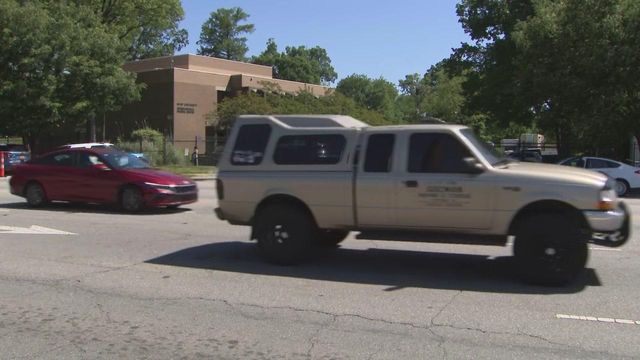3 things high school parents should stop worrying about - and what to focus on instead
Editor's note: This article was originally posted in 2017 and written by Tim Tinnesz, a father of three and head of school at St. Timothy’s School in Raleigh. St. Timothy's will host a free high school fair from 6:30 to 8 p.m. on Oct. 4.
St. Timothy's is located at 4523 Six Forks Rd., just north of Raleigh's North Hills. The event is free and open to the public.
About 30 boarding schools are scheduled to attend. Fourteen local schools will be there, including several Wake County public high schools, charter schools and private schools.
The choices parents make during children’s high school years have a huge influence on the adults they will become. The stakes are high, and the challenges can seem daunting.
In my years of working with children and teens, I’ve found that there are three things many high school parents worry about too much, and three other areas where their efforts might be better spent if they are to ensure the brightest future for their children. Here’s my advice for every high school (or soon-to-be high school) parent:
Worry Less About: College Acceptance
For some parents, the overriding purpose of the high school years seems to be creating the most compelling college application possible, and everything else — perhaps even learning — is of secondary importance. They feel intense pressure to override the English teacher who recommended honors instead of AP, to meet with the biology teacher to determine how “we” can move that “B” up to an “A,” and to challenge (sometimes vigorously) teachers or administrators who attempt any disciplinary measure that could mar their child’s college application.
They do all this because of a disconcertingly competitive college admissions process at a desired handful of schools, and they certainly deserve sympathy. However, if parents are not careful, the long-lasting lessons their children learn during these critical years are that it is better to look good than to be good, better to appear smart than to struggle and learn, and better to assign blame than to take responsibility. That approach may help them on a college application, but it will not serve them well for the 70-plus years of their lives afterwards.
Focus More On: College - and Life - Readiness
The right perspective begins by remembering that the parenting “finish line” (if there ever really is one) is not a flawless college application, but instead when children become independent, responsible adults who lead fulfilling lives of meaning and purpose. The high school years offer our children some of the most important lessons of their lives, but truly learning from them may require mistakes and failures that may not be celebrated in the college admissions process. Short of dangerous or risky behavior that could end in jail time or death, there are remarkably few mistakes that would prevent an incredibly successful and fulfilling adult life, and some of the biggest or most painful high school-age mistakes actually can teach some of the most valuable, positive, and long-lasting life lessons.
According to the National Center for Education Statistics, there are well over 2,000 accredited, four-year, non-profit colleges and universities in the United States. Hundreds of thousands of undergraduates graduate from all of these schools each year and go on to graduate schools, medical schools, law schools, good jobs, and independent, responsible, fulfilling lives of meaning and purpose. Parents who worry mostly about college acceptance are often operating under the mistaken belief that their child can only possibly be successful in just one or a just tiny handful of those 2,000-plus colleges and universities. With some added perspective, we must remember that attending one specific undergraduate school for a few years is almost certainly not the key to a successful life for the next 70-plus years afterwards. The key to success is far more likely to be the (not-always-college-application-friendly) lessons we’re allowed to learn along the way.
Worry Less About: Happiness
We all read the headlines about teen stress, anxiety, eating disorders, even suicide, and we want to be sure no tragedy befalls our child. However, some parents are tempted to overcompensate, to go to any lengths to ensure their child is happy and to head off unhappiness any way they can.
Was a child cut from the team? Call the coach. Was the child upset because he wasn’t recognized at the ceremony? Lobby for an award. Is a child in tears about a teacher? Complain to the principal.
Or, maybe the parent directs the child not to try out for the team, arranges for the child to skip the awards ceremony, or demands that he is not placed in the unreasonable teacher’s class in the first place. These parents’ intentions are understandable — trying to ensure their children feel happy, loved, and safe during sometimes-turbulent times. However, they can also have the unfortunate effect of teaching children that happiness ought to be their number one priority. When these children finally get to college and, without mom or dad’s protection, they experience the inevitable moments of stress, sadness, unfairness, and frustration, they feel like failures, and they fall apart because they’ve never had to independently navigate unhappiness before.
Focus More On: Resilience
When my children were learning to ride a bike, I was very tempted to keep the training wheels on. It would be less stressful for me and less painful for them. With trepidation, though, I let them ride (and fall… a lot) — first in the driveway, then in the cul-de-sac by our house, and then, finally, down the street where I couldn’t see them.
High school parents can sympathize. High school is that time to “ride without the training wheels” — to develop the confidence, courage and resilience that comes from personally, mostly independently (but not alone or without a sympathetic shoulder to cry on), navigating through disappointment, adversity and unhappiness. Parents ought to explain this to their high school-age child in the moments before adversity strikes, and lovingly give them permission to be unhappy from time to time.
Being cut from the team, coming home empty-handed from the ceremony, or dealing with the unreasonable teacher, the parent’s response might be: “You’re right — this really stinks. I wish it wasn’t so. Do you want to talk about it or what you’re thinking you ought to do about it? But just know it IS going to be OK, and I’ll love you and support you no matter what.”
Worry Less About: Being
What do you want to be when you grow up? If you work hard, you can be anything you want to be. All I want is for you to be happy.
Many of us heard things like this when we were growing up. They’re not terrible to say, but there’s danger in encouraging goals that overly-focus on being: they can instill a subtle, innate tendency towards selfishness. The lesson learned might be “My purpose in life is to do whatever it takes to make myself happy and successful,” without any regard of others.
The other challenge with being as a goal is that, eventually, either you are (and are successful) or you aren’t (and feel like a failure). If your child decides she wants to be a doctor, then there are two outcomes of her efforts: (1) she becomes a doctor (and feels like she’s achieved her life’s purpose by her early thirties), or (2) she fails biology, or does poorly on the MCAT, etc., and doesn’t become a doctor (and feels like a failure, with little to show for her efforts). The high school years, in particular, are the time when our children are sophisticated enough to understand (if we’ll teach them) that there is so much more to life than simply being.
Focus More On: Doing
Here are the better questions every parent ought to ask their high school-age child: Why do you exist? For what purposes do you think you are on this earth?
These are big, complicated questions, but they are also motivational, powerful, and momentous. Parents should ensure their children focus on action verbs and not being verbs when answering these questions, too. We are not on this earth to be something; we’re on this earth to do something — and that “something” almost always involves someone beyond ourselves.
The high school student might start to believe that her purpose is to care for people who are injured or sick. She then can be engaged further. What people? The elderly? Children? Refugees? And how? Through medical care? Through counseling? Through ministry? This kind of dialog during the high school years can set children on the most durable, resilient, responsible, and fulfilling path into adulthood. It can shape their choice of college (and help them realize that many of those 2,000-plus colleges might be appropriate for their path), their college major, and their career choice.
Importantly, it can give them confidence and resilience in the face of the inevitable disappointments and setbacks that life will bring. You may not be who, or where, or what you’d prefer to be in the moment, but you almost always can do something about it.
The bottom line: Being a parent is the most rewarding, challenging, and consequential thing any of us will do in our lives, and there is no perfect way to do it.
My advice for parenting through that critical high school transition from childhood to adulthood: When we worry less about college acceptance and more about readiness, less about happiness and more about resilience, less about being and more about doing, we will set our children on a course for independent, responsible, and fulfilling adult lives of meaning and purpose — the absolute best outcome any parent can hope for.
Tim Tinnesz is head of school at St. Timothy’s School, an Episcopal school serving 585 students from pre-K through eighth grade in Raleigh. Tim also currently sits on the boards of Triangle Day School in Durham and Note in the Pocket, a nonprofit serving children and families in North Carolina. A father of three, Tim previously spent many years as a middle and high school teacher and principal.









